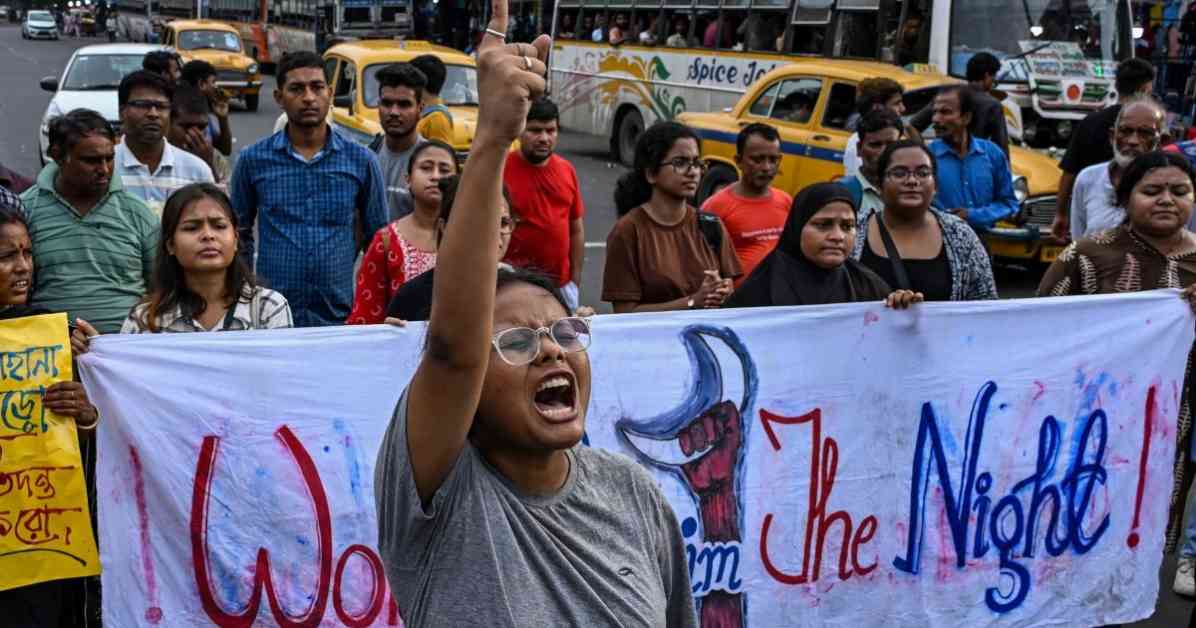Doctors Demand Safety and Justice After Tragic Rape and Murder in India
Kolkata, India – The streets of Kolkata were filled with thousands of doctors and medical students on a hot, humid afternoon in August. Female doctors, clad in black T-shirts and some with stethoscopes around their necks, led the march through the capital of the eastern Indian state of West Bengal. Their message was clear: demand for change and safety in the wake of a horrific incident.
The tragic event that united the protesters was the rape and murder of a 31-year-old trainee medic in one of the largest government-run hospitals and medical colleges in Kolkata on August 9. The senseless loss of a promising young doctor has sparked nationwide protests, with medical professionals from various colleges across West Bengal and residents of Kolkata coming together to protest, march, and hold candlelit vigils.
The medical community is outraged and demanding justice for their fallen colleague. A major protest is planned, with organizers calling on participants to march to Nabanna, the complex that houses the West Bengal state government. The doctors and students marching in the streets are not only scared but also angry at the lack of safety within their workplace.
Increased Security Measures Urgently Needed
The demand for increased security measures in medical colleges, hospitals, and health centers in both urban and rural areas is at the forefront of the protest. The West Bengal Junior Doctors’ Front (WBJDF) is leading the charge for better security protocols, as they believe that the current system is failing to protect medical professionals adequately.
Hassan Mushtaq, a member of WBJDF and a junior doctor at RG Kar, highlighted the deficiencies in the existing security measures. He pointed out that CCTV cameras often do not work, many areas are not covered, and there is a lack of monitoring of the camera outputs. The protesters are calling for concrete action to address these security gaps to ensure the safety of medical workers.
Facing Fear and Harassment Daily
The female doctors participating in the protests shared harrowing accounts of the fear and harassment they endure on a daily basis. Anita, a junior doctor, recounted a distressing incident where a male relative of a patient physically accosted her, leaving her feeling threatened and vulnerable. She emphasized the need for better security personnel who are trained to handle difficult situations effectively.
Rita, another doctor, described a situation where she faced verbal abuse and physical intimidation from the friends of a patient who had passed away under her care. The lack of adequate security left her feeling exposed and helpless in the face of aggression. These stories highlight the urgent need for improved security measures to ensure the safety and well-being of medical professionals.
Female doctors like Sita expressed concerns about the potential escalation of verbal harassment into physical violence. The absence of sufficient security personnel and training exacerbates their sense of vulnerability in the workplace. These experiences underscore the critical importance of creating a safe and secure environment for medical workers to carry out their duties without fear.
Calls for Systemic Change and Accountability
The tragic incident at RG Kar Hospital has not only shaken the medical community but also sparked a broader conversation about gender-based violence and the need for systemic change. Bonolota Chattopadhayay, a concerned citizen, highlighted the pervasive fear and anxiety that now plagues women in society, especially in the aftermath of such a heinous crime.
Tamashree Bhowmik, a teacher, brought her young daughter to a protest march to advocate for a safer future for women. She emphasized the importance of challenging societal norms and attitudes towards women to prevent further instances of violence and abuse. These voices of solidarity and support are integral to the movement for change and accountability.
The Role of Government and Policy in Ensuring Safety
While the Supreme Court has taken steps to address workplace safety for medical workers, the response from the West Bengal government has been met with criticism. The introduction of the “Rattirer Shaathi” scheme, aimed at enhancing safety for women in hospitals, has been marred by controversial directives such as avoiding night shifts for female staff “wherever possible.”
Ruchira Goswami, a feminist and assistant professor, criticized the government’s approach as regressive and inadequate in addressing the root causes of gender-based violence. She emphasized the need for a comprehensive ecosystem that prioritizes the safety and well-being of women in the workplace. The reluctance to listen to women’s voices and implement effective policies reflects a broader societal failure to address systemic issues of gender-based violence.
The Need for Collective Action and Advocacy
The doctors and medical professionals advocating for change are not only demanding justice for their fallen colleague but also calling for a fundamental shift in how society perceives and treats women. The rise in incidents of gender-based violence and the lack of accountability highlight the urgent need for collective action and advocacy to create a safer and more equitable society for all.
As the protests continue and the voices of the medical community grow louder, there is hope for meaningful change and reform. The fight for safety, justice, and equality is far from over, but the unwavering determination of those standing up for their rights and the rights of others is a powerful force for transformation.
In conclusion, the demand for change and safety in the aftermath of the tragic rape and murder in India is a rallying cry for justice, accountability, and systemic reform. The voices of the medical community, supported by concerned citizens and advocates, are calling for a safer and more equitable society where women can live and work without fear. It is imperative that policymakers, authorities, and society as a whole listen to these voices and take decisive action to address the root causes of gender-based violence and ensure the safety and well-being of all.



























